Project Management Methodologies and Tools: A Comparative Analysis
VerifiedAdded on 2020/04/15
|8
|1572
|36
Report
AI Summary
This report delves into the distinctions between project management methodologies and project management tools. It defines methodologies as structured approaches, such as Agile and Waterfall, while characterizing tools like Gantt charts as instruments for implementing these methodologies. The report highlights the differences in structure, flexibility, and implementation, emphasizing how methodologies define 'how' and 'why' while tools define 'what' and 'when' in project execution. It underscores that methodologies provide a framework, whereas tools offer quantitative measurements, ultimately concluding that a blend of both is crucial for successful project delivery and organizational efficiency. The report also touches upon the importance of understanding these differences and how their combined use can lead to higher project success rates.
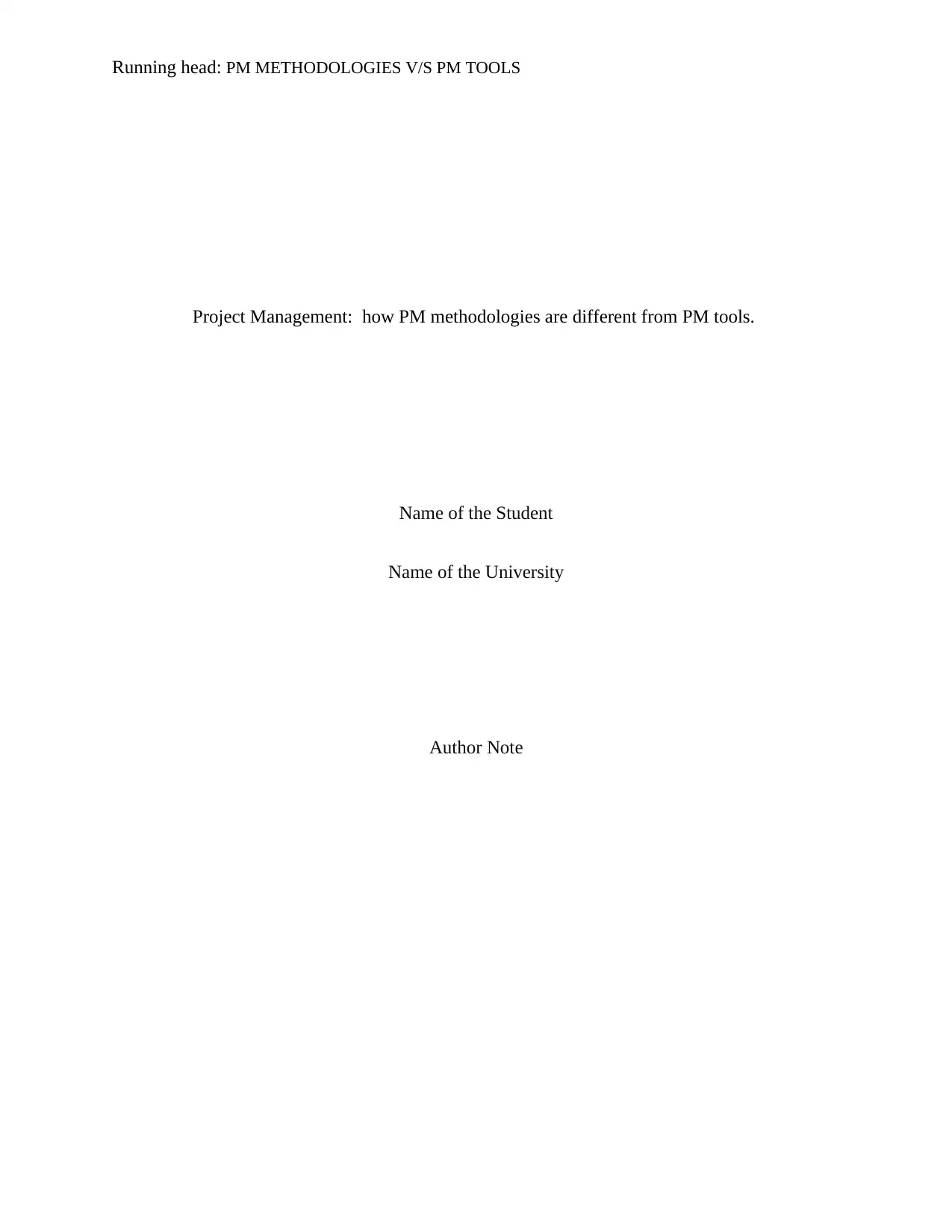
Running head: PM METHODOLOGIES V/S PM TOOLS
Project Management: how PM methodologies are different from PM tools.
Name of the Student
Name of the University
Author Note
Project Management: how PM methodologies are different from PM tools.
Name of the Student
Name of the University
Author Note
Paraphrase This Document
Need a fresh take? Get an instant paraphrase of this document with our AI Paraphraser
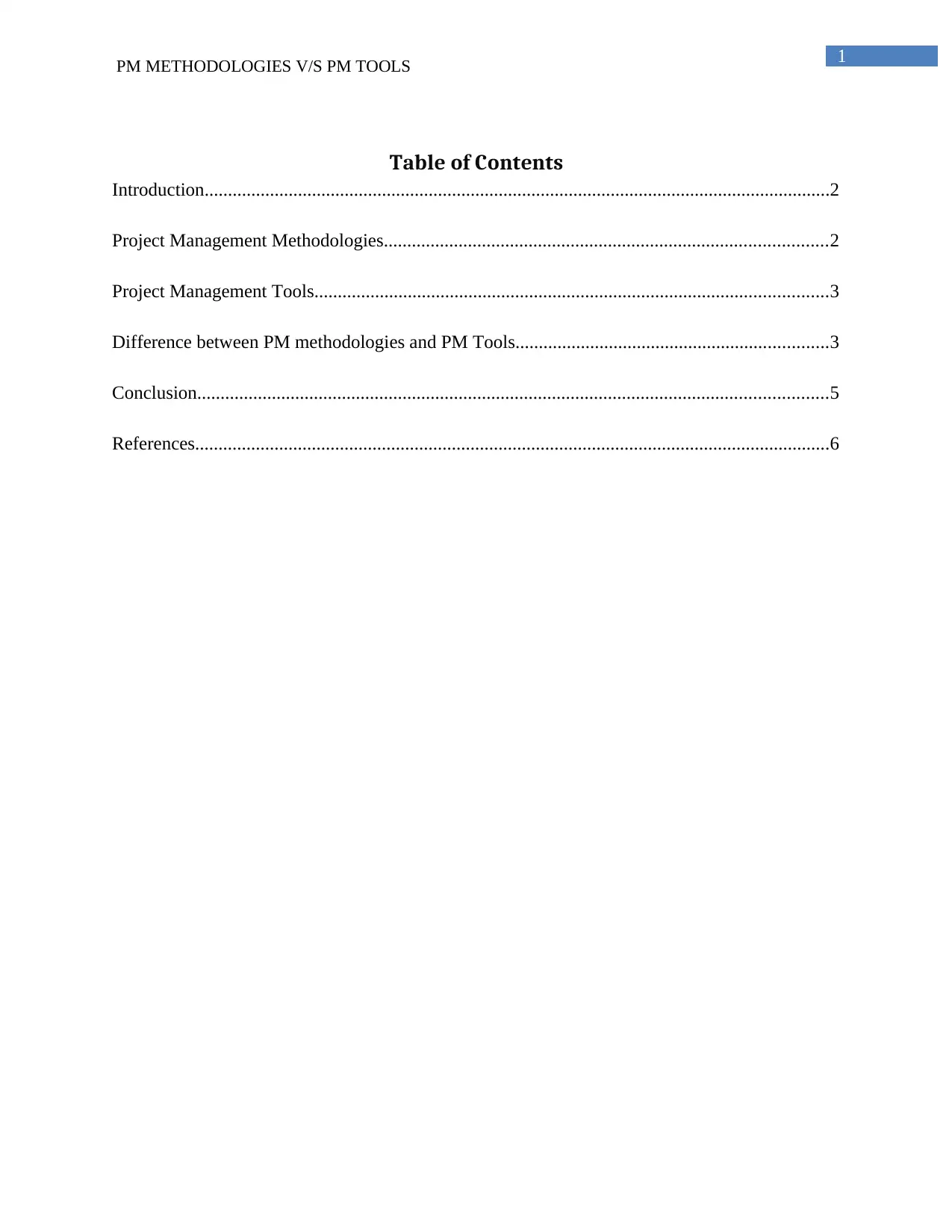
1PM METHODOLOGIES V/S PM TOOLS
Table of Contents
Introduction......................................................................................................................................2
Project Management Methodologies...............................................................................................2
Project Management Tools..............................................................................................................3
Difference between PM methodologies and PM Tools...................................................................3
Conclusion.......................................................................................................................................5
References........................................................................................................................................6
Table of Contents
Introduction......................................................................................................................................2
Project Management Methodologies...............................................................................................2
Project Management Tools..............................................................................................................3
Difference between PM methodologies and PM Tools...................................................................3
Conclusion.......................................................................................................................................5
References........................................................................................................................................6
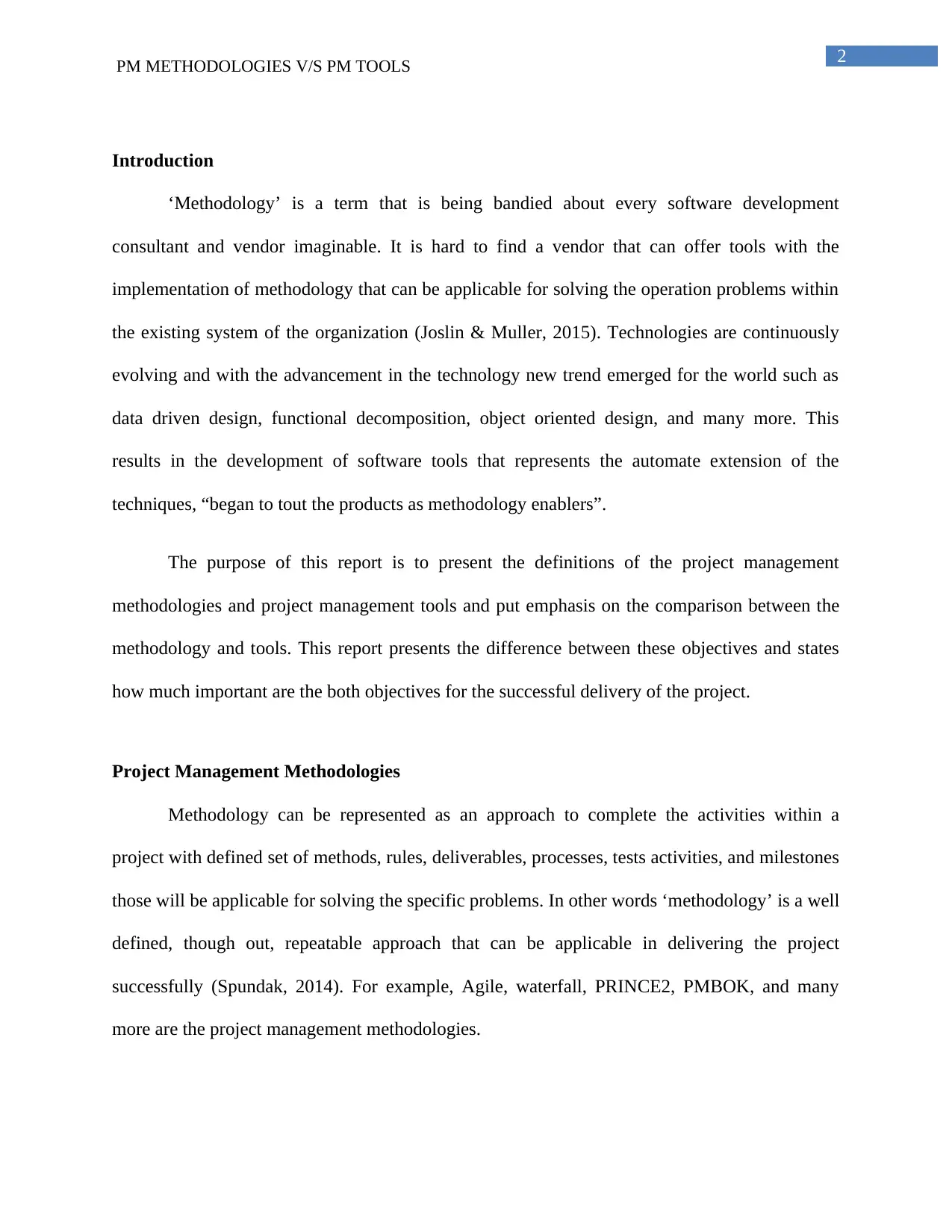
2PM METHODOLOGIES V/S PM TOOLS
Introduction
‘Methodology’ is a term that is being bandied about every software development
consultant and vendor imaginable. It is hard to find a vendor that can offer tools with the
implementation of methodology that can be applicable for solving the operation problems within
the existing system of the organization (Joslin & Muller, 2015). Technologies are continuously
evolving and with the advancement in the technology new trend emerged for the world such as
data driven design, functional decomposition, object oriented design, and many more. This
results in the development of software tools that represents the automate extension of the
techniques, “began to tout the products as methodology enablers”.
The purpose of this report is to present the definitions of the project management
methodologies and project management tools and put emphasis on the comparison between the
methodology and tools. This report presents the difference between these objectives and states
how much important are the both objectives for the successful delivery of the project.
Project Management Methodologies
Methodology can be represented as an approach to complete the activities within a
project with defined set of methods, rules, deliverables, processes, tests activities, and milestones
those will be applicable for solving the specific problems. In other words ‘methodology’ is a well
defined, though out, repeatable approach that can be applicable in delivering the project
successfully (Spundak, 2014). For example, Agile, waterfall, PRINCE2, PMBOK, and many
more are the project management methodologies.
Introduction
‘Methodology’ is a term that is being bandied about every software development
consultant and vendor imaginable. It is hard to find a vendor that can offer tools with the
implementation of methodology that can be applicable for solving the operation problems within
the existing system of the organization (Joslin & Muller, 2015). Technologies are continuously
evolving and with the advancement in the technology new trend emerged for the world such as
data driven design, functional decomposition, object oriented design, and many more. This
results in the development of software tools that represents the automate extension of the
techniques, “began to tout the products as methodology enablers”.
The purpose of this report is to present the definitions of the project management
methodologies and project management tools and put emphasis on the comparison between the
methodology and tools. This report presents the difference between these objectives and states
how much important are the both objectives for the successful delivery of the project.
Project Management Methodologies
Methodology can be represented as an approach to complete the activities within a
project with defined set of methods, rules, deliverables, processes, tests activities, and milestones
those will be applicable for solving the specific problems. In other words ‘methodology’ is a well
defined, though out, repeatable approach that can be applicable in delivering the project
successfully (Spundak, 2014). For example, Agile, waterfall, PRINCE2, PMBOK, and many
more are the project management methodologies.
⊘ This is a preview!⊘
Do you want full access?
Subscribe today to unlock all pages.

Trusted by 1+ million students worldwide
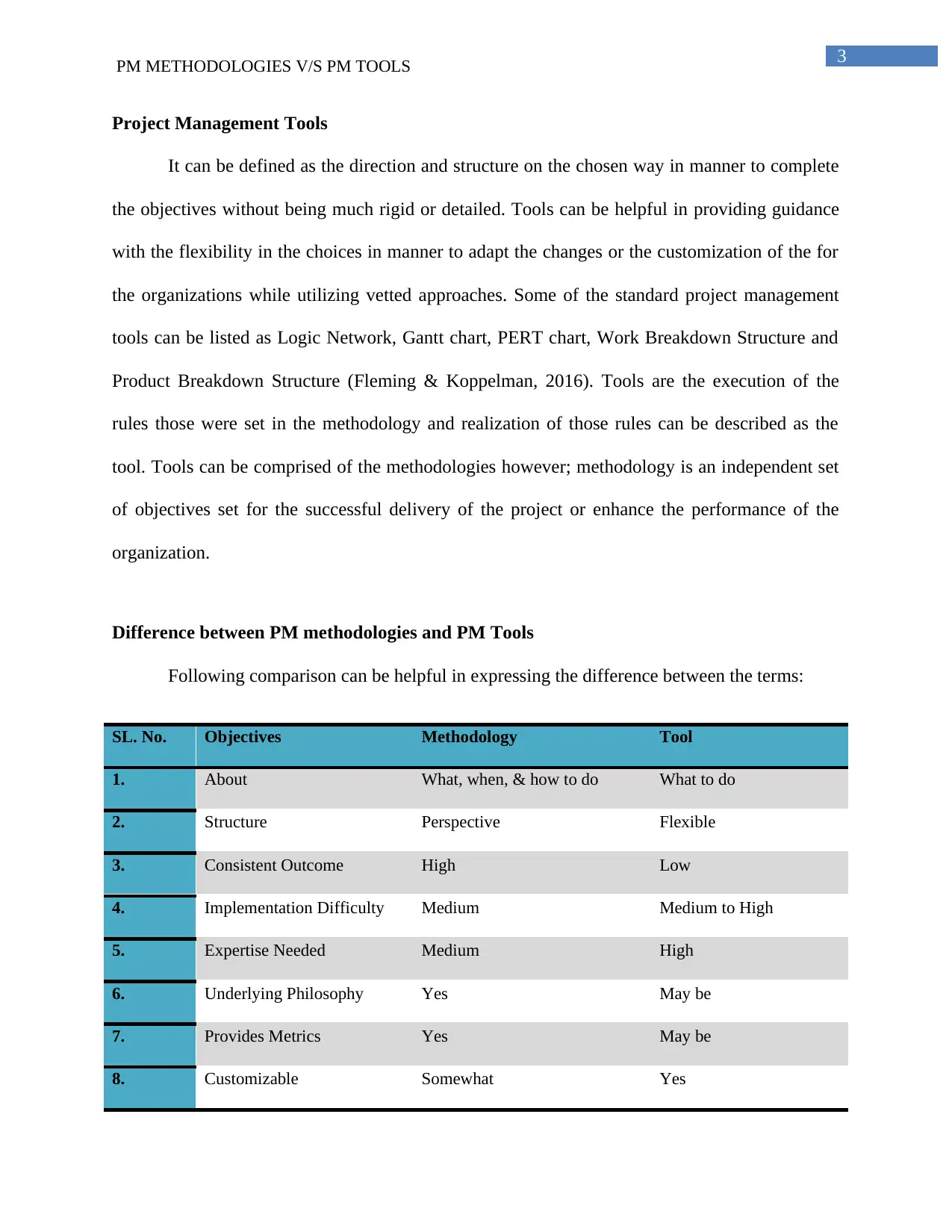
3PM METHODOLOGIES V/S PM TOOLS
Project Management Tools
It can be defined as the direction and structure on the chosen way in manner to complete
the objectives without being much rigid or detailed. Tools can be helpful in providing guidance
with the flexibility in the choices in manner to adapt the changes or the customization of the for
the organizations while utilizing vetted approaches. Some of the standard project management
tools can be listed as Logic Network, Gantt chart, PERT chart, Work Breakdown Structure and
Product Breakdown Structure (Fleming & Koppelman, 2016). Tools are the execution of the
rules those were set in the methodology and realization of those rules can be described as the
tool. Tools can be comprised of the methodologies however; methodology is an independent set
of objectives set for the successful delivery of the project or enhance the performance of the
organization.
Difference between PM methodologies and PM Tools
Following comparison can be helpful in expressing the difference between the terms:
SL. No. Objectives Methodology Tool
1. About What, when, & how to do What to do
2. Structure Perspective Flexible
3. Consistent Outcome High Low
4. Implementation Difficulty Medium Medium to High
5. Expertise Needed Medium High
6. Underlying Philosophy Yes May be
7. Provides Metrics Yes May be
8. Customizable Somewhat Yes
Project Management Tools
It can be defined as the direction and structure on the chosen way in manner to complete
the objectives without being much rigid or detailed. Tools can be helpful in providing guidance
with the flexibility in the choices in manner to adapt the changes or the customization of the for
the organizations while utilizing vetted approaches. Some of the standard project management
tools can be listed as Logic Network, Gantt chart, PERT chart, Work Breakdown Structure and
Product Breakdown Structure (Fleming & Koppelman, 2016). Tools are the execution of the
rules those were set in the methodology and realization of those rules can be described as the
tool. Tools can be comprised of the methodologies however; methodology is an independent set
of objectives set for the successful delivery of the project or enhance the performance of the
organization.
Difference between PM methodologies and PM Tools
Following comparison can be helpful in expressing the difference between the terms:
SL. No. Objectives Methodology Tool
1. About What, when, & how to do What to do
2. Structure Perspective Flexible
3. Consistent Outcome High Low
4. Implementation Difficulty Medium Medium to High
5. Expertise Needed Medium High
6. Underlying Philosophy Yes May be
7. Provides Metrics Yes May be
8. Customizable Somewhat Yes
Paraphrase This Document
Need a fresh take? Get an instant paraphrase of this document with our AI Paraphraser
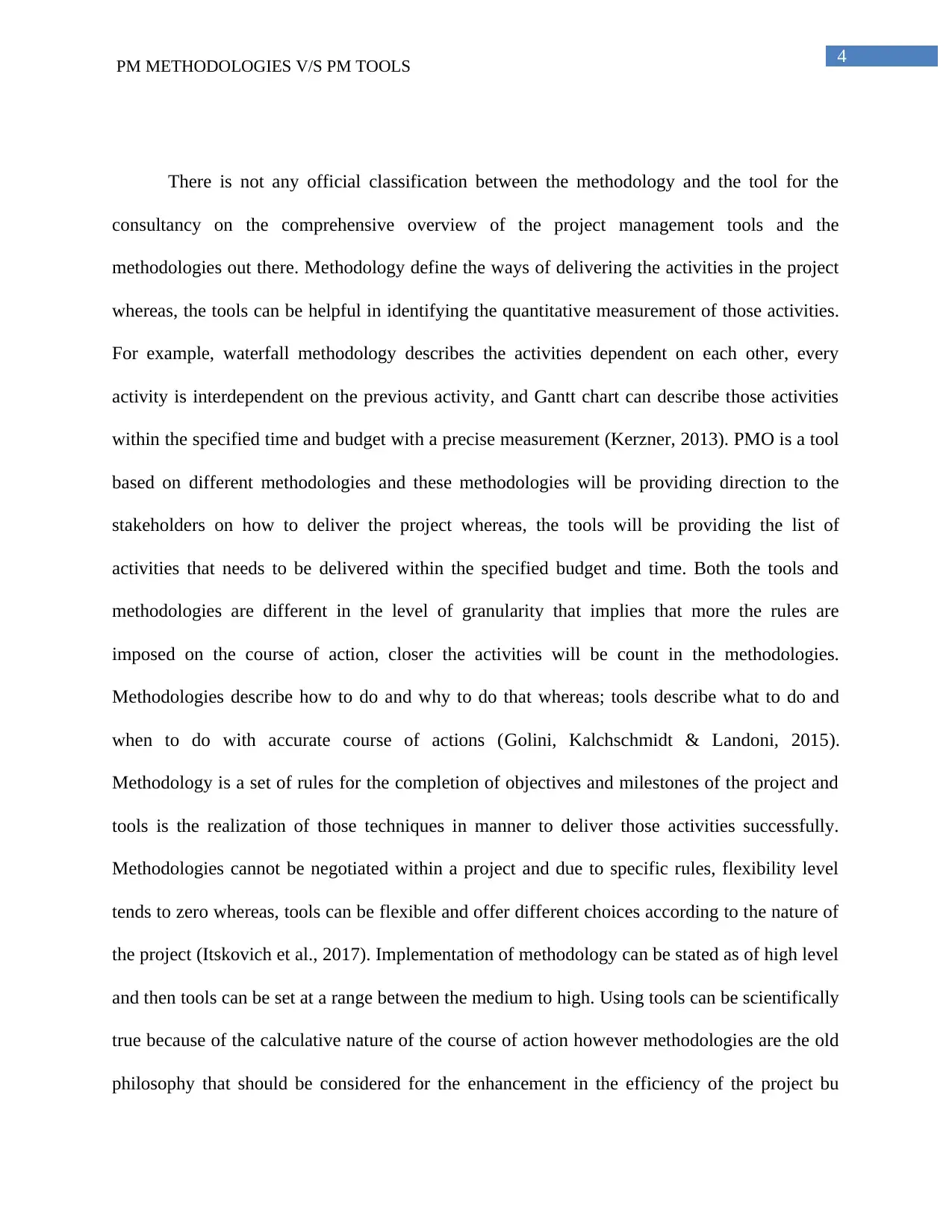
4PM METHODOLOGIES V/S PM TOOLS
There is not any official classification between the methodology and the tool for the
consultancy on the comprehensive overview of the project management tools and the
methodologies out there. Methodology define the ways of delivering the activities in the project
whereas, the tools can be helpful in identifying the quantitative measurement of those activities.
For example, waterfall methodology describes the activities dependent on each other, every
activity is interdependent on the previous activity, and Gantt chart can describe those activities
within the specified time and budget with a precise measurement (Kerzner, 2013). PMO is a tool
based on different methodologies and these methodologies will be providing direction to the
stakeholders on how to deliver the project whereas, the tools will be providing the list of
activities that needs to be delivered within the specified budget and time. Both the tools and
methodologies are different in the level of granularity that implies that more the rules are
imposed on the course of action, closer the activities will be count in the methodologies.
Methodologies describe how to do and why to do that whereas; tools describe what to do and
when to do with accurate course of actions (Golini, Kalchschmidt & Landoni, 2015).
Methodology is a set of rules for the completion of objectives and milestones of the project and
tools is the realization of those techniques in manner to deliver those activities successfully.
Methodologies cannot be negotiated within a project and due to specific rules, flexibility level
tends to zero whereas, tools can be flexible and offer different choices according to the nature of
the project (Itskovich et al., 2017). Implementation of methodology can be stated as of high level
and then tools can be set at a range between the medium to high. Using tools can be scientifically
true because of the calculative nature of the course of action however methodologies are the old
philosophy that should be considered for the enhancement in the efficiency of the project bu
There is not any official classification between the methodology and the tool for the
consultancy on the comprehensive overview of the project management tools and the
methodologies out there. Methodology define the ways of delivering the activities in the project
whereas, the tools can be helpful in identifying the quantitative measurement of those activities.
For example, waterfall methodology describes the activities dependent on each other, every
activity is interdependent on the previous activity, and Gantt chart can describe those activities
within the specified time and budget with a precise measurement (Kerzner, 2013). PMO is a tool
based on different methodologies and these methodologies will be providing direction to the
stakeholders on how to deliver the project whereas, the tools will be providing the list of
activities that needs to be delivered within the specified budget and time. Both the tools and
methodologies are different in the level of granularity that implies that more the rules are
imposed on the course of action, closer the activities will be count in the methodologies.
Methodologies describe how to do and why to do that whereas; tools describe what to do and
when to do with accurate course of actions (Golini, Kalchschmidt & Landoni, 2015).
Methodology is a set of rules for the completion of objectives and milestones of the project and
tools is the realization of those techniques in manner to deliver those activities successfully.
Methodologies cannot be negotiated within a project and due to specific rules, flexibility level
tends to zero whereas, tools can be flexible and offer different choices according to the nature of
the project (Itskovich et al., 2017). Implementation of methodology can be stated as of high level
and then tools can be set at a range between the medium to high. Using tools can be scientifically
true because of the calculative nature of the course of action however methodologies are the old
philosophy that should be considered for the enhancement in the efficiency of the project bu
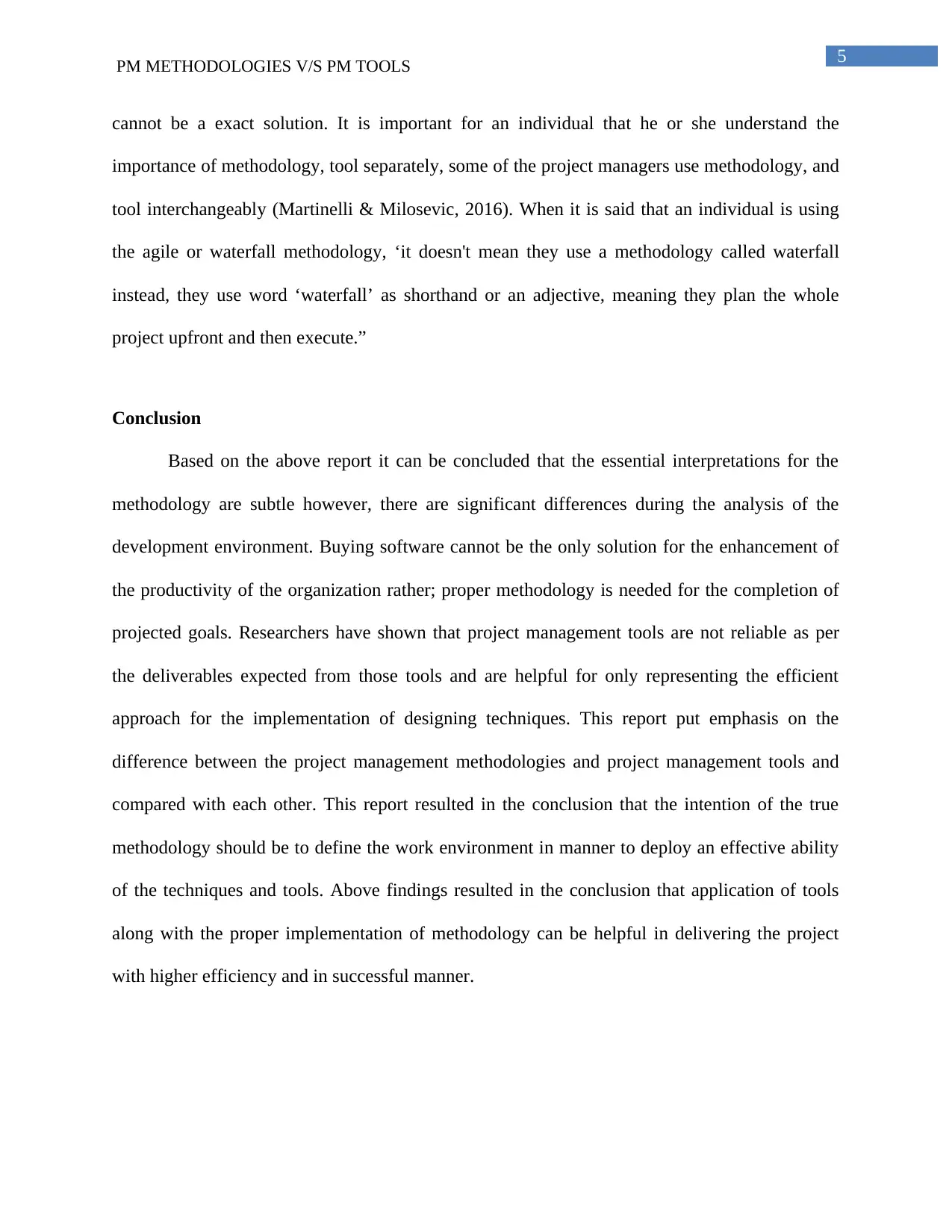
5PM METHODOLOGIES V/S PM TOOLS
cannot be a exact solution. It is important for an individual that he or she understand the
importance of methodology, tool separately, some of the project managers use methodology, and
tool interchangeably (Martinelli & Milosevic, 2016). When it is said that an individual is using
the agile or waterfall methodology, ‘it doesn't mean they use a methodology called waterfall
instead, they use word ‘waterfall’ as shorthand or an adjective, meaning they plan the whole
project upfront and then execute.”
Conclusion
Based on the above report it can be concluded that the essential interpretations for the
methodology are subtle however, there are significant differences during the analysis of the
development environment. Buying software cannot be the only solution for the enhancement of
the productivity of the organization rather; proper methodology is needed for the completion of
projected goals. Researchers have shown that project management tools are not reliable as per
the deliverables expected from those tools and are helpful for only representing the efficient
approach for the implementation of designing techniques. This report put emphasis on the
difference between the project management methodologies and project management tools and
compared with each other. This report resulted in the conclusion that the intention of the true
methodology should be to define the work environment in manner to deploy an effective ability
of the techniques and tools. Above findings resulted in the conclusion that application of tools
along with the proper implementation of methodology can be helpful in delivering the project
with higher efficiency and in successful manner.
cannot be a exact solution. It is important for an individual that he or she understand the
importance of methodology, tool separately, some of the project managers use methodology, and
tool interchangeably (Martinelli & Milosevic, 2016). When it is said that an individual is using
the agile or waterfall methodology, ‘it doesn't mean they use a methodology called waterfall
instead, they use word ‘waterfall’ as shorthand or an adjective, meaning they plan the whole
project upfront and then execute.”
Conclusion
Based on the above report it can be concluded that the essential interpretations for the
methodology are subtle however, there are significant differences during the analysis of the
development environment. Buying software cannot be the only solution for the enhancement of
the productivity of the organization rather; proper methodology is needed for the completion of
projected goals. Researchers have shown that project management tools are not reliable as per
the deliverables expected from those tools and are helpful for only representing the efficient
approach for the implementation of designing techniques. This report put emphasis on the
difference between the project management methodologies and project management tools and
compared with each other. This report resulted in the conclusion that the intention of the true
methodology should be to define the work environment in manner to deploy an effective ability
of the techniques and tools. Above findings resulted in the conclusion that application of tools
along with the proper implementation of methodology can be helpful in delivering the project
with higher efficiency and in successful manner.
⊘ This is a preview!⊘
Do you want full access?
Subscribe today to unlock all pages.

Trusted by 1+ million students worldwide
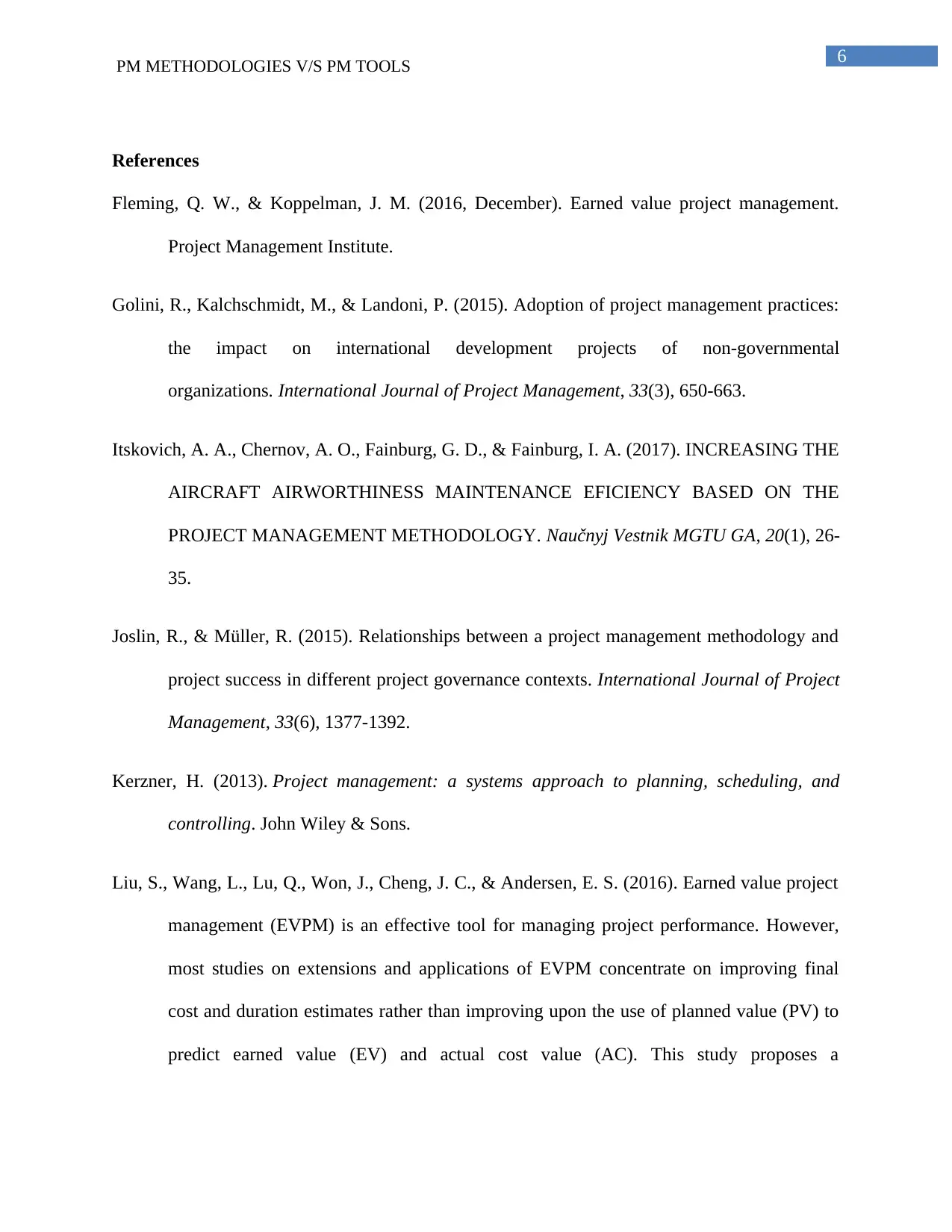
6PM METHODOLOGIES V/S PM TOOLS
References
Fleming, Q. W., & Koppelman, J. M. (2016, December). Earned value project management.
Project Management Institute.
Golini, R., Kalchschmidt, M., & Landoni, P. (2015). Adoption of project management practices:
the impact on international development projects of non-governmental
organizations. International Journal of Project Management, 33(3), 650-663.
Itskovich, A. A., Chernov, A. O., Fainburg, G. D., & Fainburg, I. A. (2017). INCREASING THE
AIRCRAFT AIRWORTHINESS MAINTENANCE EFICIENCY BASED ON THE
PROJECT MANAGEMENT METHODOLOGY. Naučnyj Vestnik MGTU GA, 20(1), 26-
35.
Joslin, R., & Müller, R. (2015). Relationships between a project management methodology and
project success in different project governance contexts. International Journal of Project
Management, 33(6), 1377-1392.
Kerzner, H. (2013). Project management: a systems approach to planning, scheduling, and
controlling. John Wiley & Sons.
Liu, S., Wang, L., Lu, Q., Won, J., Cheng, J. C., & Andersen, E. S. (2016). Earned value project
management (EVPM) is an effective tool for managing project performance. However,
most studies on extensions and applications of EVPM concentrate on improving final
cost and duration estimates rather than improving upon the use of planned value (PV) to
predict earned value (EV) and actual cost value (AC). This study proposes a
References
Fleming, Q. W., & Koppelman, J. M. (2016, December). Earned value project management.
Project Management Institute.
Golini, R., Kalchschmidt, M., & Landoni, P. (2015). Adoption of project management practices:
the impact on international development projects of non-governmental
organizations. International Journal of Project Management, 33(3), 650-663.
Itskovich, A. A., Chernov, A. O., Fainburg, G. D., & Fainburg, I. A. (2017). INCREASING THE
AIRCRAFT AIRWORTHINESS MAINTENANCE EFICIENCY BASED ON THE
PROJECT MANAGEMENT METHODOLOGY. Naučnyj Vestnik MGTU GA, 20(1), 26-
35.
Joslin, R., & Müller, R. (2015). Relationships between a project management methodology and
project success in different project governance contexts. International Journal of Project
Management, 33(6), 1377-1392.
Kerzner, H. (2013). Project management: a systems approach to planning, scheduling, and
controlling. John Wiley & Sons.
Liu, S., Wang, L., Lu, Q., Won, J., Cheng, J. C., & Andersen, E. S. (2016). Earned value project
management (EVPM) is an effective tool for managing project performance. However,
most studies on extensions and applications of EVPM concentrate on improving final
cost and duration estimates rather than improving upon the use of planned value (PV) to
predict earned value (EV) and actual cost value (AC). This study proposes a
Paraphrase This Document
Need a fresh take? Get an instant paraphrase of this document with our AI Paraphraser
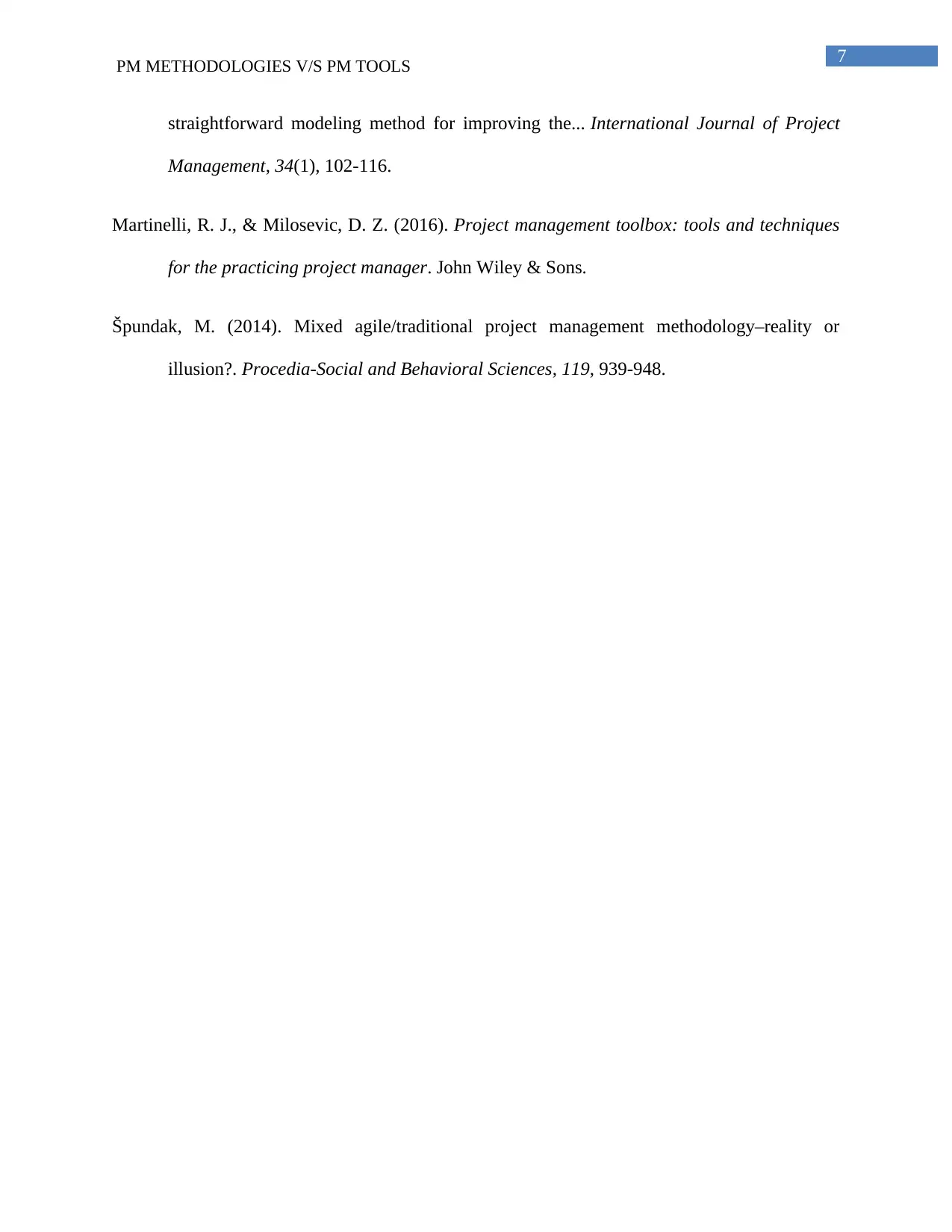
7PM METHODOLOGIES V/S PM TOOLS
straightforward modeling method for improving the... International Journal of Project
Management, 34(1), 102-116.
Martinelli, R. J., & Milosevic, D. Z. (2016). Project management toolbox: tools and techniques
for the practicing project manager. John Wiley & Sons.
Špundak, M. (2014). Mixed agile/traditional project management methodology–reality or
illusion?. Procedia-Social and Behavioral Sciences, 119, 939-948.
straightforward modeling method for improving the... International Journal of Project
Management, 34(1), 102-116.
Martinelli, R. J., & Milosevic, D. Z. (2016). Project management toolbox: tools and techniques
for the practicing project manager. John Wiley & Sons.
Špundak, M. (2014). Mixed agile/traditional project management methodology–reality or
illusion?. Procedia-Social and Behavioral Sciences, 119, 939-948.
1 out of 8
Related Documents
Your All-in-One AI-Powered Toolkit for Academic Success.
+13062052269
info@desklib.com
Available 24*7 on WhatsApp / Email
![[object Object]](/_next/static/media/star-bottom.7253800d.svg)
Unlock your academic potential
Copyright © 2020–2026 A2Z Services. All Rights Reserved. Developed and managed by ZUCOL.



